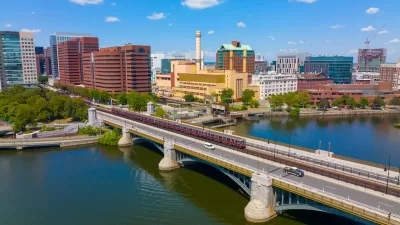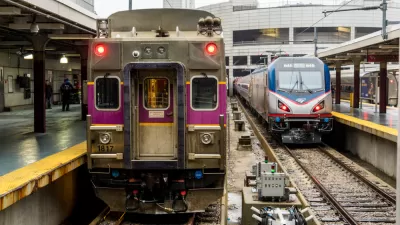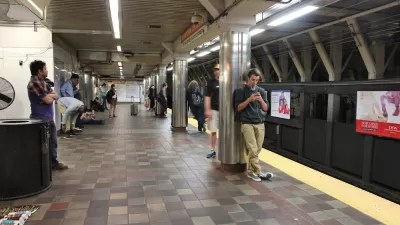A spate of recent development agreements have generated extra cash to run additional transit service on the MBTA system in Boston.

"As debate roars over how to fund improvements to Greater Boston’s dysfunctional mass transit system, state officials are increasingly pressuring real estate developers to pitch in," reports Tim Logan.
"In recent months, they have reached agreements with developers of two big projects north of downtown to pay for extra service on the MBTA’s Orange Line," adds Logan.
Logan explains that developers have traditionally funded improvements to transit stations, not transit service, in development agreements. The first example of the new model came in 2015, when the developer of the Encore casino agreed to spend $7.4 million to fund extra service.
More recently, "developers of Hood Park — an eight-building campus of office space and housing near Sullivan Square — agreed to pay about $830,000 over 15 years for one extra Orange Line train during early afternoon rush hour," according to Logan. Other recent examples are included, as well as the context set by the MBTA's operating budget and the region's booming real estate market.
The story follows shortly after controversies in the region over service failures, and a call from the regional tech sector to raise new revenues to improve public transit service.
FULL STORY: Developers pressed to fund extra T service

Maui's Vacation Rental Debate Turns Ugly
Verbal attacks, misinformation campaigns and fistfights plague a high-stakes debate to convert thousands of vacation rentals into long-term housing.

Planetizen Federal Action Tracker
A weekly monitor of how Trump’s orders and actions are impacting planners and planning in America.

In Urban Planning, AI Prompting Could be the New Design Thinking
Creativity has long been key to great urban design. What if we see AI as our new creative partner?

King County Supportive Housing Program Offers Hope for Unhoused Residents
The county is taking a ‘Housing First’ approach that prioritizes getting people into housing, then offering wraparound supportive services.

Researchers Use AI to Get Clearer Picture of US Housing
Analysts are using artificial intelligence to supercharge their research by allowing them to comb through data faster. Though these AI tools can be error prone, they save time and housing researchers are optimistic about the future.

Making Shared Micromobility More Inclusive
Cities and shared mobility system operators can do more to include people with disabilities in planning and operations, per a new report.
Urban Design for Planners 1: Software Tools
This six-course series explores essential urban design concepts using open source software and equips planners with the tools they need to participate fully in the urban design process.
Planning for Universal Design
Learn the tools for implementing Universal Design in planning regulations.
planning NEXT
Appalachian Highlands Housing Partners
Mpact (founded as Rail~Volution)
City of Camden Redevelopment Agency
City of Astoria
City of Portland
City of Laramie





























